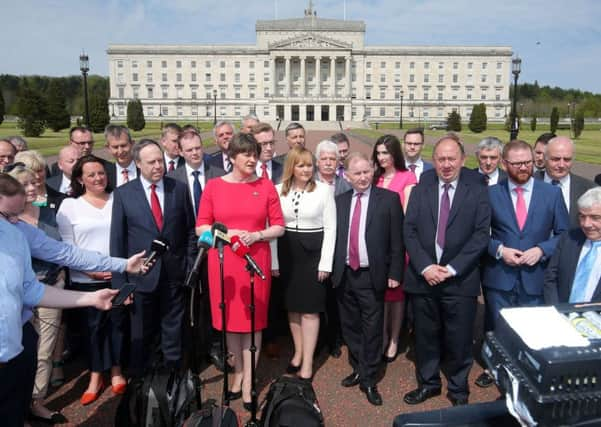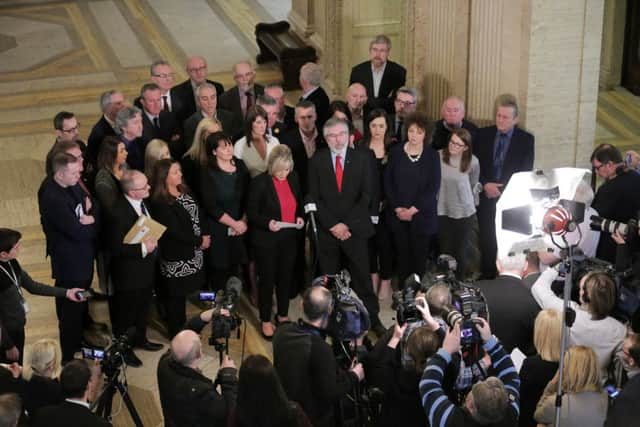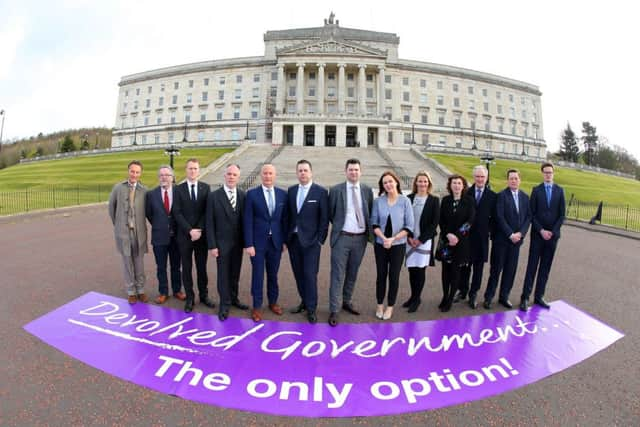Ben Lowry: Whatever the outcome of these talks, unionism cannot go on like this in the future


This week it appeared that agreement was getting close, and there was heavy engagement between the parties.
But since March the prospects of a deal have waxed and waned. Recently it seemed almost everyone had given up on agreement.
Advertisement
Hide AdAdvertisement
Hide AdIf a deal is reached, we will find out soon enough the detail.


Certainly the mood across unionism is of intense suspicion to Irish language legislation, and deep anger that Sinn Fein has been allowed to issue red lines.
Unionists clearly feel unable even to contemplate non-negotiable demands that would require concessions from nationalism. There would be fury if they dared.
A few weeks ago I suggested one of several red lines that unionists could, in any sensible society, reasonably demand: that the pitiably lenient bail and sentencing policy that currently applies for serious terrorist offences be overhauled.
Advertisement
Hide AdAdvertisement
Hide AdBut while every other western society is acting rapidly to protect its citizens from terrorist murderer, even such a basic red line from unionism would bring the wrath of the political establishment on both sides of the Irish Sea down on them.


Thus unionists are always reduced to minimising the ground that they give to nationalists.
In recent months civic leaders have repeatedly urged the various parties to compromise so that the assembly can return.
Business leaders posed for photographs on the steps of Stormont.
Church leaders also made pleas.


Advertisement
Hide AdAdvertisement
Hide AdSuch appeals, if heeded, would mean movement towards the Sinn Fein demands – because, to repeat, as the DUP made clear again and again, it had no such demands.
In fact it was so insistent on that point that at times the party seemed desperate to see Stormont return, which is hardly a strong negotiating position when Gerry Adams is your chief opponent.
This is not to say that the DUP is blameless for the appalling situation unionists are in.
The RHI scheme was so badly handled that it raises questions as to whether Northern Ireland is yet ready for devolution. The scale of that scandal was such that the News Letter decided early to devote big coverage to it (and will do so).


Advertisement
Hide AdAdvertisement
Hide AdThere was also a serious mis-judging of tone and display of hubris by the DUP after the 2016 assembly success, which has had grim consequences for unionism.
Public anger at RHI was such that the DUP seemed to suffer some protest in March (a reduced vote). But it was Sinn Fein’s turn to be triumphalist, which led to DUP voters returning to the polls in large numbers in the June general election.
Thoughtful members of the DUP must realise that they got votes from a wide range of unionism to stop Sinn Fein, including from scores of thousands of people who don’t like the DUP much.
This damages their authority to announce suddenly a deal that involves concessions to republicans that almost 300,000 unionists turned out in force to counter.
Advertisement
Hide AdAdvertisement
Hide AdI cannot be the only person who shuddered in distaste at being told that the Irish language is no threat to the Union.
We aren’t school kids. Perhaps people who say inflammatory things about Gaelic need to be told that. The rest of us are concerned at how republicans intend to use legislation, not at the language itself.
When have you ever heard Sinn Fein address nationalists in this way, ahead of a major concession to placate unionists after months of agitation from the latter?
But it will be many months before a fuller story of RHI is established, and that will be the time to assess political fallout from the saga.
Advertisement
Hide AdAdvertisement
Hide AdIn the meantime unionism urgently needs to think about long term tactics.
For example, unionists are far more vulnerable to the suspension of Stormont than republicans.
Sinn Fein has a military approach to its MLAs: they have to hand much of their salaries over to the party, and if they don’t like party policy, tough – they wouldn’t dare speak out publicly.
All such personal ambition gives way to the ultimate project.
Advertisement
Hide AdAdvertisement
Hide AdOther parties have a more normal approach to these things, and naturally their politicians are concerned about their livelihoods.
It is hard enough to attract people of calibre into politics even without the prospect of years without full (or perhaps any) pay.
Arlene Foster said last month that it was “quite offensive” to say that the threat of loss of MLA pay might be an incentive to restore the institutions, but in fact it isn’t an insult. MLAs would barely be human if, in such circumstances, they felt no temptation to push a deal that leads to the return of their jobs.
Unionists of all persuasions must now lobby the most influential politicians at Westminster about how to counter this vulnerability when the next crisis arises (as it surely will within a few years, if Stormont does somehow return).
Advertisement
Hide AdAdvertisement
Hide AdIf Sinn Fein thinks it can secure maximum advantage by playing hardball against people who need to make a living, so be it. But London must come up with solutions that will enable the assembly to carry on without them.
The other thing that cannot continue amid a diminishing unionist vote and a long-term threat to unionism is one party negotiating in secret before announcing a deal, perhaps after briefly informing the UUP of the shape of that deal.
It is hardly what the 300,000 DUP voters want. They want the best possible negotiating response to Sinn Fein.
Even if the DUP is acting with the utmost integrity, there will always be the suspicion in such circumstances that it is putting party first.
Advertisement
Hide AdAdvertisement
Hide AdThis is not an easy problem to solve, because of course the largest party within either community controls the negotiations in talks in which cross-community power sharing is the necessary outcome.
But we need now to think about how unionism is going to align long term.
In the coming weeks I will write about two possible ways forward for the UUP: one a merger with the DUP, but this would only be accepted by the UUP if was an entirely new party rather than a takeover – and it is hard to see the DUP accepting that (such a move would also need, paradoxically, to be accompanied by an NI21-style new party formed by liberal ex UUP).
Another route is to link up with the Tories again, regardless of whether leftists in the UUP like it. The Conservatives remain a powerful political entity.
Advertisement
Hide AdAdvertisement
Hide AdAnd even if the UUP followed the latter route, there would have to be informal agreement that when republicans try to bring NI to a close the UUP-DUP-Tories and others will work in tandem to prevent it.